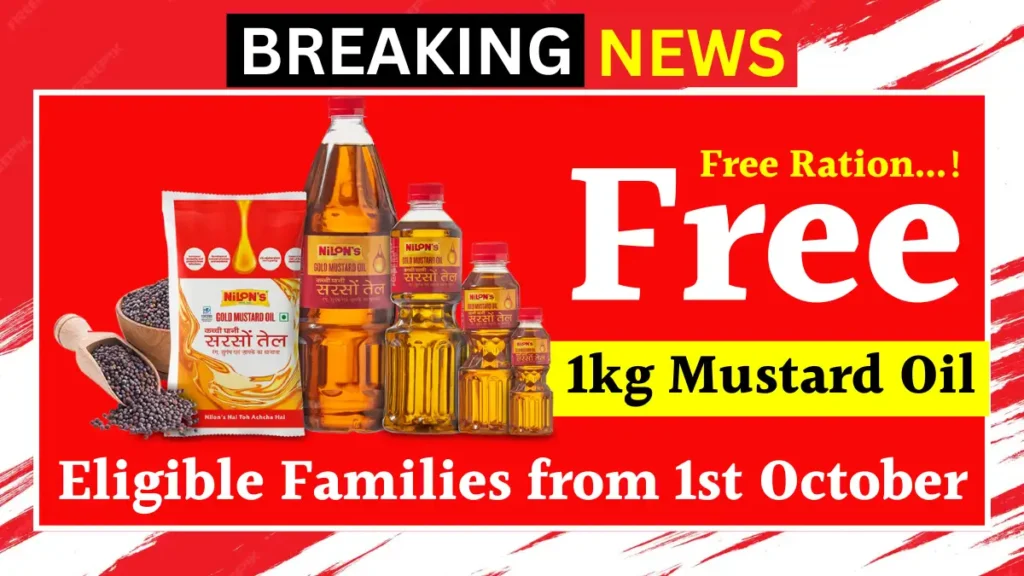The government has announced a significant relief measure aimed at easing the burden on millions of households across the country. Starting from 1st October, free ration supplies, including essential commodities such as mustard oil and sugar, will be distributed under the ongoing welfare schemes.
This step is expected to provide much-needed support to economically weaker sections, especially in the face of rising inflation and economic challenges.

Understanding the Initiative
The government’s decision to provide free ration is part of its broader strategy to ensure food security and improve nutrition among vulnerable populations. Mustard oil and sugar are staples in many Indian households, playing a crucial role in daily cooking and dietary habits. By offering these items free of cost, the government aims to reduce the expenditure of families struggling to meet their basic needs.
This initiative complements existing food subsidy programs, ensuring that beneficiaries receive not only grains but also essential cooking ingredients. The inclusion of mustard oil and sugar reflects the government’s understanding of the nutritional needs and cooking patterns prevalent in the country.
Who Will Benefit?
The free ration program primarily targets families eligible under the Public Distribution System (PDS). This includes those holding ration cards categorized as Below Poverty Line (BPL), Antyodaya Anna Yojana (AAY), and other economically disadvantaged groups. The initiative is expected to reach millions of households, particularly in rural and semi-urban areas where food insecurity remains a pressing issue.
Women, children, and elderly members of families stand to gain significantly from this scheme, as better access to essential cooking oils and sugar can enhance overall health and well-being. For many, these commodities are often out of reach due to financial constraints, making this government support crucial.
Impact on Household Budgets
One of the immediate benefits of this program will be the easing of household budgets. Cooking oil and sugar are recurring expenses that can strain monthly incomes, especially for low-income families. By receiving these essentials for free, families can redirect their limited resources to other critical needs such as healthcare, education, and housing.
Moreover, this measure comes at a time when inflation has pushed up food prices across the board. Mustard oil, in particular, has seen significant price increases, impacting affordability. The government’s intervention will help stabilize the cost burden and provide relief amid economic uncertainty.
Supply Chain and Distribution
The success of this program hinges on the efficient distribution of ration supplies through existing channels. The government has indicated that the Public Distribution System will be strengthened to ensure smooth delivery of mustard oil and sugar alongside traditional staples like rice and wheat.
Warehousing, transportation, and local fair price shops will play vital roles in the logistics of this operation. Transparency and accountability measures will be essential to prevent leakages and ensure that the benefits reach the intended recipients without delay.
Challenges and Considerations
While the free ration initiative is a welcome step, it also poses several challenges. Managing the increased demand for mustard oil and sugar requires careful planning to avoid shortages or supply disruptions. The government must coordinate with producers and suppliers to maintain steady inventory levels.
Additionally, ensuring that the distribution process is free from corruption and inefficiency is critical. Past experiences with ration schemes have highlighted issues such as diversion of supplies and beneficiary exclusion. Strengthening monitoring mechanisms and leveraging technology could help address these concerns.
Long-term Implications
Beyond immediate relief, the government’s move to provide free mustard oil and sugar could have lasting implications for social welfare policies. It signals a commitment to expanding the scope of public assistance programs to cover a wider range of nutritional needs.
This approach may also encourage other states to adopt similar measures, fostering a more inclusive food security framework across the country. By investing in such programs, the government contributes to reducing malnutrition and improving the quality of life for marginalized communities.
Community Response and Feedback
Early reactions from communities and advocacy groups have been largely positive. Many have lauded the government for recognizing the importance of cooking oil and sugar in the daily diet. Beneficiaries express hope that this support will make a tangible difference in their lives.
At the same time, some experts call for continuous evaluation of the program’s effectiveness and inclusivity. They emphasize the need for regular feedback from beneficiaries to fine-tune distribution methods and address any gaps.
Conclusion
The government’s initiative to provide free mustard oil and sugar starting from 1st October is a significant step toward enhancing food security and supporting vulnerable populations. By alleviating the financial pressure on essential cooking ingredients, this program promises to improve nutrition and quality of life for millions.
Successful implementation will require robust supply chain management, transparency, and community engagement. If these elements come together effectively, this welfare measure could become a model for comprehensive public assistance schemes in the future.
As the distribution begins, it will be important to monitor its impact closely and ensure that the benefits reach those who need them the most. This initiative offers hope and relief in challenging times, reflecting a government commitment to building a more equitable society through targeted social support.
Disclaimer: The information provided in this blog is based on government announcements and available data as of now. Readers are advised to verify details from official sources before making decisions. The author and publisher are not responsible for any discrepancies or changes in government policies after publication.
